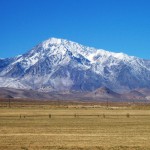Several dozen United States senators started the week without sleep—an all-nighter to draw the nation’s attention to climate change policy. They’re aiming for a bill to minimize its damage.
Planning preventative policies is great, a handful of experts said at Climate Science and Policy through the Looking Glass, a conference at the University of California, Santa Cruz held Feb. 28 and March 1. But, it’s also time to adapt, to figure out how to live in this already-changed world, said Erika Zavaleta, director of the UC Santa Cruz Department of Environmental Studies, who moderated the panel discussion.
“Adaptation is not a choice, we have to do it,” Zavaleta said. “Even if we stopped (all) emissions today, we’re committed to another 100 years of rising temperatures.”
To adapt, individuals first have to care, UC Santa Cruz marine biologist Terrie Williams told the several hundred people in attendance. And that’s not so easy to do. Everyone doesn’t have the opportunity, as she does, to travel to Antarctica and see, first hand, as penguins plunge to their deaths after an iceberg melts into the sea.
“It is extremely frustrating, especially as a biologist, when you’re out there every day saying ‘This is wrong, this is bad’,” Williams said.
Start, perhaps, with food. Agriculture undergirds the American economy. Yet Amrith Gunasekara, the science advisor to the California Department of Food and Agriculture, found most farmers were doing nothing at all to adapt.
“We recognize we have a lot to lose,” he said. “How do we start talking about this with the people who produce your food?”
The state is planning outreach efforts targeting everyone from farmers to school children. In addition, it’s important for the business community to take a leadership role, said panelist Mike Mielke, a board member of the Silicon Valley Leadership Group.
He announced the creation of a new nonprofit organization, California Climate Breakthrough Initiative, tasked with orchestrating a campaign akin to a presidential race.
“We have to do something meaningful,” Mielke said this week. “This is monumentally big.”
CCBI is one of several non-profits linked to the Silicon Valley Leadership Group, the well-known business advocacy organization that Mielke joined after leaving position promoting corporate social responsibility in Washington, D.C.
To ward off the worst ramifications, rising temperatures must be curbed at an average of two degrees Celsius attributable to greenhouse gases, according to a CCBI policy statement. The two-degree goal accords with the James Hansen et al’s alarm-raising study, published Dec. 3 in PLOS ONE that warns of “disastrous impacts on today’s young people, future generations, and nature.”
Many additional efforts are planned, with a goal of substantive change in the works before the 2015 United Nations Climate Change Conference held in Paris, Mielke promised. The 2016 U.S. presidential election will be crucial, as well, he said.
Mielke said he is starting with an outreach effort targeting major philanthropy organizations that can spearhead grassroots efforts nationwide.
And what about a changed climate forecast for Santa Cruz?
Along with higher sea levels, Santa Cruz is slated to receive shorter winters marked by variable rainfall, according to a 2012 U.S. Geological Survey study that examined the effects of climate change in the Santa Cruz Mountains.
Higher carbon concentrations are expected to bring shorter winters marked by variable rainfall, Lorraine and Alan Flint write. Even if rainfall amounts hold steady, a longer summer will mean more frequent water shortages.
Staying up all night probably won’t help with that.







Comments are closed.